- Home
- Winston Groom
The Allies Page 13
The Allies Read online
Page 13
Yet somehow, buoyed by his articulate arguments and conciliatory manners, Roosevelt managed to dodge the Tammany bullet. In the end the insurgents failed to wrest power from the machine. They set a precedent not only in New York but in cities and states across the country. A note came from cousin Theodore: “Just a line to say we are really proud of the way you have handled yourself.” To Franklin, it meant the world.18
Roosevelt spent much of his time in Albany working on bills that would benefit his mostly rural farm constituents in his Hyde Park district. And he did get on board with a bill to increase safety measures in state factories following the dreadful Triangle Shirtwaist factory fire at New York City’s Washington Square that had killed 146 workers, most of them women.
In 1912, Roosevelt had genuine fears that he might not win reelection. He had continued his fight with the Tammany regime and its leaders had long memories. However, he rode to victory on the coattails of both Woodrow Wilson, who was running as a Democrat, and his cousin Theodore, a Republican who was running for a third term on the platform of the new Progressive Party. TR lost but the split in the Republican Party ensured a Democratic victory.
During the insurgency Franklin Roosevelt came to know an experienced newspaperman named Louis Howe, described by one of Roosevelt’s biographers as looking like “a medieval gnome.” Howe was a diminutive, asthmatic, afflicted, chain-smoking wretch in shabby suits and stained shirts who often repelled people by his appearance and his politics. But Roosevelt recognized in him a canny political adviser, and in time he became indispensable. Howe was frequently to be found in the Roosevelt household, sometimes even living there. Eleanor tolerated him because she had to—but to Sara he was an abomination.19
In March 1912 Roosevelt gave a speech in Troy, New York, one that in hindsight supports the premise that even then he was toying with the idea of socialism. Speaking to a group called the People’s Forum, Roosevelt defended a notion that the “liberty of the community, rather than the liberty of the individual” should be foremost in a society. He made an analogy to the fact that many farms in New York (and in all of New England as well) were barren, and the farmers gone to the Midwest. This Roosevelt attributed to the fact that many farmers simply “wore out the land” by not using lime and fertilizers. “These early farmers,” he went on, “gave no thought to the liberty of the community,” and concluded with the notion that “the time is not far distant when the government of the State [of New York] will rightly, and of necessity, compel every cultivator of land to pay back to that land some quid pro quo.”20
“That little phrase [liberty—or rights—of the community], which might seem innocent to the unwary,” began a running argument a hundred years later in the opinion pages of the Wall Street Journal, “is the essence of every totalitarian system in history from Hitler to Mao to Stalin.” The writer went on to say, “The Nazis even had ‘The Common Good Comes Before the Individual Good’ inscribed on the rims of their silver coins,” and concluded indignantly that “there is no possible way to increase the liberty of the community while diminishing the liberty of the individual. Phrases like that are an excuse for the power hungry.”21
Roosevelt, of course, would have been horrified to be compared with monsters such as Hitler, Mao, and Stalin, who didn’t even exist in his world at the time. But the speech does give some insight into Roosevelt’s mindset—especially in light of what he set into motion twenty years later with his New Deal programs, which gave the state powers few had ever dreamed of except in wartime.
With Woodrow Wilson newly in the White House, many political appointments were being handed out in Washington. Roosevelt hoped in particular to become assistant secretary of the Navy. Given his interest in the sea, and the fact that his cousin Theodore had used the same position as a springboard to propel himself to the governorship of New York, the job seemed an ideal fit. It was a tough, demanding post, because the assistant secretary in fact ran the department day to day, and the Navy was spread out all over the world. But there would also be perks, such as the magnificent yachts Dolphin and Sylph that the service kept for dignitaries.
While in the lobby of the capital’s Willard hotel on the morning of Inauguration Day 1913, Roosevelt encountered Josephus Daniels, Wilson’s new Navy secretary. The two men had met before at the Democratic National Convention the previous summer. Now Daniels came right to the point. “How would you like to come to Washington and be assistant secretary of the navy?” he asked.
“It would please me better than anything else in the world,” Roosevelt replied. He seemed to live a charmed life—at least for now.
*1 Named in honor of the ship that the English explorer Henry Hudson, in the service of the Dutch East India Company, sailed into New York Harbor in 1609.
*2 During both world wars, Roosevelt told this story to emphasize the Germans’ penchant for military aggression.
*3 In 1905 alone there were eighteen deaths and upwards of two hundred injuries, making a case for football’s banishment. But Franklin’s cousin President Theodore Roosevelt stepped in to “save” it by brokering a deal among all schools playing the game to clean up its rules and ban or penalize dangerous formations and practices.
*4 Ironically, it was James Roosevelt’s cousin Theodore who, as U.S. president, nixed the Nicaraguan canal for one through Panama. James’s investment was lost, although by that time he was dead.
*5 In fact, Taddy was shipped down to Florida where he lived under an alias, until moving back to New York, where he repaired automobiles for a living. He never used his large inheritance and cut off all communications with his family, except to inform the Astors that on his death the money should be given to the Salvation Army. Sadie had long since moved out, and when he died in 1958 Taddy left $5 million to the Salvation Army.
*5 In the days before the Seventeenth Amendment of 1913, most U.S. senators were elected by their state legislatures, not by popular elections.
CHAPTER FIVE
The opening of the 1901 Parliament was both splendid and somber. Queen Victoria had died a few weeks earlier and her son His Royal Highness Crown Prince Albert Edward was now His Majesty King Edward VII. It was he who opened the ceremony, which he described as “a moment of national sorrow,” as the country continued to mourn the death of his mother.
These were somber times for other reasons as well. The Boer War ground relentlessly on, piling up casualties in excess of fifty-five thousand (including more than ten thousand killed) and dragging in soldiers from more than a dozen British colonies, as well as the bulk of the British army.
It was a divided political house too, with the conservative Tories, the party of Churchill’s father, still in charge. They were led by the venerable Lord Salisbury (Robert Cecil) and his top cabinet, including Arthur J. Balfour and Joseph Chamberlain. The opposition were well represented also, with such names as Edward Grey, Herbert Asquith, and Richard Haldane destined for prominence when the world erupted into war early in the next decade. Inside the House of Parliament, these men renounced their opponents in speeches that would have resulted in duels in older times, but off the floor most of them remained the best of friends. Because it cost money to become a member of Parliament, almost all were from the upper classes and knew one another socially. When they spoke on the floor they always used the phrase “the Right Honourable Gentleman” to describe their opponents.
With this in mind, Churchill prepared to give his “maiden speech,” which was the custom for newly elected members. He was preceded, however, by the Liberal Party, in the person of a man who would become a principal figure in his political life until the end of the Second World War. This man, a Welshman from a coal mining district, was David Lloyd George, whose piercing progressive oratory would for the next quarter century alight on the ears of Tory politicians as a relentless din. Today, the Tories would get their first taste of it when the Right Honourable Gen
tleman from the opposition gave his speech.
The burning issue, of course, was the Boer War. Lloyd George lit into it right off in the process of introducing an amendment. He accused the British army of committing atrocities: of prosecuting a war “against women and children,” of barn burning, and other unsavory acts. Citing the high casualty rate, he fumed that those parliamentarians who voted to continue the war were guilty of manslaughter. He called the British peace proposals ridiculous.
When his turn came Churchill, at the urging of an older member, said to clucks of laughter: “Instead of making his violent speech without moving his moderate amendment, the Right Honourable Gentleman had better have moved his moderate amendment without making his violent speech.” He then proceeded to make his own moderate speech regarding the war, defending the army by pointing out that the Boers were conducting guerrilla war by day and returning to their own homes by night, where they were given sustenance by their wives and other family members. He closed by referring to his father and “a certain splendid memory, which many honourable members still preserve.”1
The reaction was generally favorable, with light applause. Churchill was then hustled off to the House bar, where he received the appropriate lubrications. The tone of his speech had been independent, annoying some Tories, but certainly not very pleasing to the Liberals either. The speech set Churchill somehow apart and presaged his stormy relationship with the British House of Commons.
Churchill associated with a group of several younger Tory members, including Lord Hugh Cecil, Ian Malcolm, Lord Percy, and Arthur Stanley, which often dissented from the party line. They called themselves the Young Hooligans (a play on “Hughligans” à la Cecil) and every so often invited—or were invited by—one of the older, more conservative Tories to dine together. In all of 1901, Churchill made twelve speeches in the House, gave more than thirty paid lectures, played polo twelve times, spent fourteen days hunting (steeplechase), two days shooting, and eighteen days abroad on holiday. For a while he had a splendid time. But more and more he found himself disagreeing with the Tory leadership on issues such as tariffs versus free trade, home rule for Ireland, the budget, labor unions, and any number of smaller matters. At last, in exasperation, he wrote his mother in 1903, “I am a Liberal in all but name.”2
Though he continued to sit on the Tory side of the House, Churchill in his speeches began insulting his party’s leadership. He even picked a public fight with the prime minister, prompting other members to walk out of the speech he was making. He was going through a crisis of conscience, terrified of leaving the party where his father had made himself a household name. But he simply could not seem to help himself. As his biographer William Manchester put it, “He was going through the political equivalent of a divorce suit, and approaching the brink of a breakdown.” In the midst of this tumult, Churchill once stood to begin a speech and fumbled for words, then went completely silent, looking around for notes that did not exist, because he carefully memorized all his speeches. Finally he sat down, put his hands to his face, and sobbed, saying, “I thank the honourable members for having listened to me.”
On May 31, 1904, with little ado, he crossed the floor and sat with the Liberals. The first person to welcome him with a heartfelt handshake was David Lloyd George, even though Churchill had once gladly referred to Liberals as prigs and filthy toads. Now, his former Tory colleagues regarded him as “the filthiest of all toads”: a traitor.
Nevertheless, his future was now brighter. Churchill swore he’d changed parties on principle, and not the other way around. Lo and behold, his prediction of a Liberal victory in Parliament came true in the next election of 1906. The Tories were swept from power and Churchill was poised to join the new government.
Over the next eight years Churchill rose upward in the Liberal government in a number of capacities, including becoming president of the Board of Trade and, later, home secretary. In these offices he remained a stalwart liberal—a radical, even—amazing his friends and infuriating his enemies. He was involved in labor union strikes and tariff disputes; he pushed for a welfare state—minimum wage, health insurance, old-age pensions; and he backed a contentious effort to defang the House of Lords by removing its veto power over bills produced by the House of Commons. He was mute on women’s suffrage and, of all things, favored the prohibition of alcohol.
* * *
CHURCHILL HAD BEEN IN his new position as undersecretary of state in the Colonial Office a short while when, at a dance, his mother introduced him to tall, nineteen-year-old Clementine Hozier, a beauty who asked, “How do you do?” During what has been somewhat tackily described as “a pregnant pause,” Churchill, then twenty-nine years old, replied not at all, but instead simply stood and stared until she excused herself. After this unpromising encounter, both went their separate ways for the next four years.
Four years later, in 1908, she and Churchill met again at a dinner given by her great-aunt that neither wanted to attend. Clementine had just returned from a day of giving French lessons and was tired, and Churchill “claimed it would be a great bore.” Her mother scolded her into going in deference to the kindness of the aunt, who had financed her debut. He, who remained in his bath even as the dinner hour approached, was chastised by his private secretary Edward Marsh, who reminded Churchill that it was this selfsame aunt, Lady Jeune St. Helier, who had interceded with army chief Sir Evelyn Wood to get Churchill on the Omdurman campaign, which sealed his fame as a war correspondent.3
Clementine and Winston were seated next to each other, it turned out, and this time he opened the conversation by asking if she had read The Life of Lord Randolph, Churchill’s popular biography of his father. When she replied that she had not, he asked whether if he sent a copy she would read it. She agreed, but the copy never arrived, “which made a bad impression on me,” she wrote years later.4
Churchill, however, must have seen something in Clementine that he had missed in other women and was evidently impressed the few times they had met. He asked his mother if she would invite Clementine to a small party at Salisbury Hall. This time, he courted Clementine exquisitely. But, in what at first seemed a misfortunate coincidence, Clementine and her mother were off next day to a six-week tour of Europe. This, however, gave Churchill—by now a master of the English language—the decided advantage of courting her in letters.
When she returned from her European tour, each was clearly smitten with the other. Churchill’s cousin Sunny, the Duke of Marlborough, graciously invited Clementine and a few other guests to a party at his magnificent Blenheim Palace. Churchill proposed by a lake during a ferocious rainstorm, and she accepted.
The wedding was held a month later in St. Margaret’s Church, Westminster, on Saturday, September 12, 1908. Among the guests were David Lloyd George; Ian Hamilton, Churchill’s friend and mentor from Indian army days; and Sir Bindon Blood. As a testament to British “political civility,” presents were received from A. J. Balfour, Joseph Chamberlain, and Ian Malcolm—Tories all. The king sent a gold-handled walking cane. Best man was Hugh Cecil, Churchill’s old friend from his days as one of the Tory Hooligans. Presiding over the service was J. E. C. Welldon, Churchill’s headmaster at Harrow (much as Endicott Peabody had performed the Roosevelts’ wedding).5
Few women have been so abruptly pitchforked into the kind of political hay wagon that Winston Churchill drove. Clementine must have gotten a whiff of this when, mere minutes after the wedding services ended, she noticed her husband and Lloyd George in an animated political conversation in an enclave of the church.
Their honeymoon began at Blenheim and ended in Venice, where Churchill was furiously revising chapters of a book he was writing on Africa. During the course of the European tour she discovered her new husband wore delicate and expensive pink silk underpants, while she wore cheap cotton chemises. A month after the wedding she was pregnant.
Three months later the new couple moved
into a house on Eccleston Square. Clementine gave birth to a girl, Diana. There would be four more children over the next thirteen years: Randolph, 1911; Sarah, 1914; Marigold, 1918; and Mary, 1922. Not all of them turned out as Churchill would have wished—but that’s true in many families, if not most.
Churchill was almost constantly on the go in his positions with the Foreign Office and afterward the Board of Trade, which put something of a strain on the marriage. They loved each other unswervingly all through the years, but once when he was in Paris, Clementine wondered if there were other women in his life and in a fit of jealousy she wrote him a note to this effect. After pledging total fealty he wrote: “We do not live in a world of small intrigues, but of serious & important affairs…You ought to trust me because I do not love & will never love any woman in the world but you.”6
Unlike her husband, Clementine was highly sensitive to anything she perceived as a political slight. Churchill chose to confine his opposition to the House of Commons and, to Clementine’s dismay, retained among his friends many staunch conservatives with whom he ate, drank, and gambled in London’s various gentlemen’s clubs.
His government salary was now about $500,000 in today’s currency, but the family had many expenses: servants, stables, entertainments, clubs. As a result, Churchill never felt “wealthy,” as were so many of his friends. He had also put on weight, and with it he became somewhat stooped. He had plenty of work to do but was not playing polo on a regular basis or getting other forms of heavy exercise as he did in the army. Still, life was good.

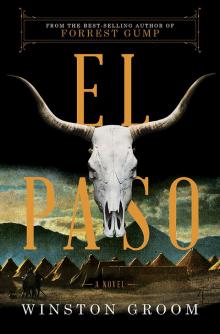 El Paso
El Paso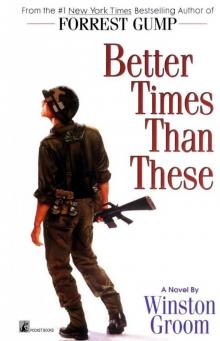 Better Times Than These
Better Times Than These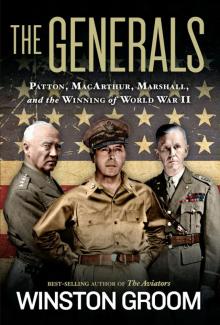 The Generals
The Generals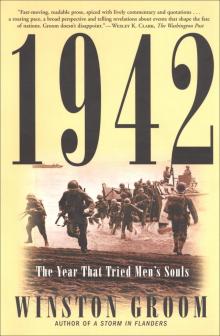 1942: The Year That Tried Men's Souls
1942: The Year That Tried Men's Souls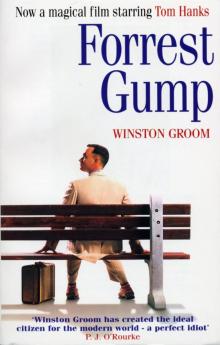 Forrest Gump
Forrest Gump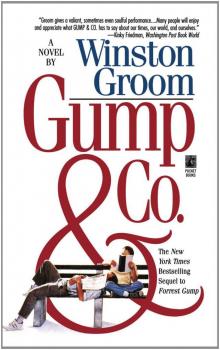 Gump and Co.
Gump and Co.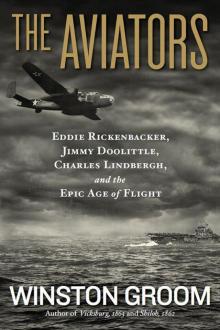 The Aviators
The Aviators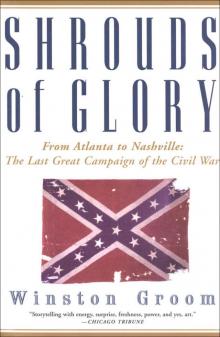 Shrouds of Glory
Shrouds of Glory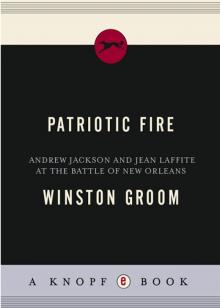 Patriotic Fire
Patriotic Fire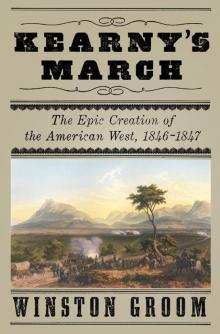 Kearny's March
Kearny's March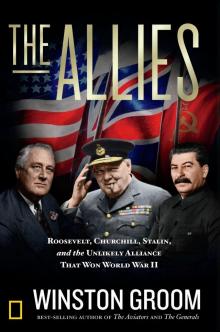 The Allies
The Allies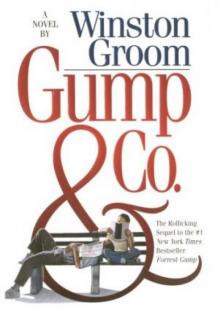 Gump & Company fg-2
Gump & Company fg-2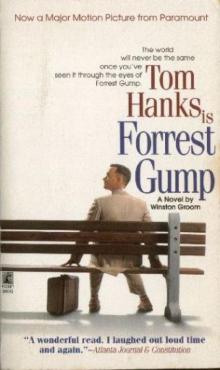 Forrest Gump fg-1
Forrest Gump fg-1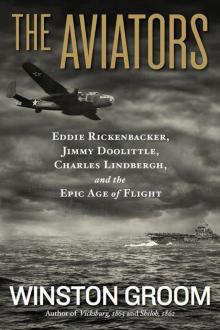 The Aviators: Eddie Rickenbacker, Jimmy Doolittle, Charles Lindbergh, and the Epic Age of Flight
The Aviators: Eddie Rickenbacker, Jimmy Doolittle, Charles Lindbergh, and the Epic Age of Flight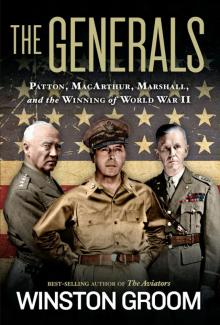 The Generals: Patton, MacArthur, Marshall, and the Winning of World War II
The Generals: Patton, MacArthur, Marshall, and the Winning of World War II